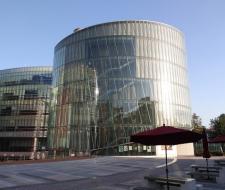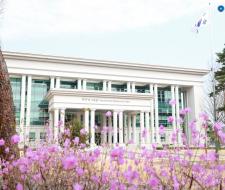Study in South Korea. 97 best institutions in South Korea
- Study in South Korea: Opportunities, Processes, and Costs
- Universities and Colleges in South Korea
- Types of Universities in South Korea
- Cost of Studying in South Korea
- Language courses in South Korea
- Grading System in South Korea
- The Academic Year in Korea
- Admission Requirements
- Literature and references
This content was developed and approved with active participation of Arnold I.Szepesi.
In the process of preparing the material, we referenced the following sources:
- https://en.wikipedia.org/wiki/Education_in_South_Korea
- https://www.internations.org/south-korea-expats/guide/education
-
 from 10000.00 $ / year
from 10000.00 $ / year -
 from 5000.00 $ / year
from 5000.00 $ / year -
 #9 in Best Global Universities in South Korea
#9 in Best Global Universities in South Korea South KoreaSeoulCurrently watching: 1from 795.00 $ / year
South KoreaSeoulCurrently watching: 1from 795.00 $ / year -
 from 2500.00 $ / year
from 2500.00 $ / year -
 from 7500.00 $ / year
from 7500.00 $ / year -

-
 from 1030.00 $ / semester
from 1030.00 $ / semester -

-
 from 1070.00 $ / semester
from 1070.00 $ / semester -
 from 5000.00 $ / year
from 5000.00 $ / year
South Korea has the status of one of the smartest countries in the world. According to statistics, over 70% of young adults have a higher education diploma or are studying now. This year, in 2025, South Korea is aimed at making some revolutionary changes, which will contribute to increasing the academic standards and fixing social inequality and diversity problems.
The educational system of South Korea was distinguished by rapid growth and intense development during the past years. From the mid 20th century, the educational system was featured by an increase in the number of kindergartens, schools and higher educational institutions. Also, the 21st century was marked by internationalization of South Korean universities. In addition, the percentage of foreign students in Korea is increasing annually.
School education in South Korea includes 3 stages. The first two – primary and secondary education is obligatory for all pupils.
Alternative destinations
Study in South Korea: Opportunities, Processes, and Costs
South Korea is famous for its robust educational system which can offer a wide range of programs at various levels, including Bachelor's, Master's, and PhD. Korea's educational institutions, particularly secondary and high schools, highlight discipline and meticulousness. Korean schools lay the foundation to successful university entrance and future career prospects.
Secondary Education in South Korea
-
Middle School makes an emphasis on studying of Mathematics, the Korean and English languages, and Natural Sciences. In addition, students choose subjects such as Arts and Physical Education. During the final year of studying students actively prepare for graduation exams.
-
High School offers programs with specialization in Science, Languages, and Arts. Education is intensive, with up to 11 subjects, and culminates in the "Sung" exam, similar to the SAT, covering Korean, Math, and English.
Universities and Colleges in South Korea
South Korea’s higher education is diverse and unique. There are universities, vocational colleges, teacher training institutes, and theological seminaries. These institutions offer:
-
Bachelor’s Degrees: Typically a 4-year program, with the exception of medical and architecture programs of study, which last for up to 6 years.
-
Master’s Degrees: A 2-year program with a mandatory requirement to prepare and defend a master’s thesis, pass certain exams, including in English proficiency.
-
PhD Programs: Available as independent 3-4 year programs that are wrapped around the PhD thesis and the guidance of a scientific supervisor. There are also so-called integrated programs that combine Master’s and Doctoral levels in one. Such programs usually last 4 years.

What's the best time to apply to schools, and what should applicants prepare for?
It's best to start early, showing interest and getting in touch with the admissions office. Plan a visit, talk to current students and teachers, and make sure you feel comfortable with the surroundings.
Types of Universities in South Korea
-
National Universities: Government-funded.
-
State Universities: Operated by local authorities.
-
Private Universities: The majority, established by non-profit foundations and organizations.
Enrollment Process for International Students
Applications for admission are open twice a year for the corresponding semesters. International students generally need the following documents:
-
University application form.
-
Educational credentials which include either a transcript of records or a diploma supplement;
-
Language proficiency certificates (TOPIK for Korean programs, IELTS/TOEFL for English programs).
-
Passport copy and proof of citizenship.
-
Financial documentation.
-
Crucial materials like motivation letters, research plans, or portfolios for graduate applicants.
Cost of Studying in South Korea
The cost of education at an international school depends on the child's age, the school itself, and the chosen program, ranging from $15,000 to $45,000 per year.
The tuition fees in university are stipulated by the educational institution you have chosen and the preferred curriculum. On average, annual cost of studying are the following:
- Bachelor's degree (English) — from $13,000,
- Master's degree (English) — from $22,000,
- MBA (English) — from $27,000,
- Bachelor's degree (Korean) — from $6,000,
- Master's degree (Korean) — from $4,000.
The cost of language preparation (in Korean, English) starts from $2,000 with a duration of 2 weeks.
Scholarships and grants are available to foreign students. Sometimes financial aid can cover up to 100% of tuition fees.
Deciding on pursuing education in South Korea, students are provided with wide opportunities, as they can choose secondary education or diverse university programs. With its focus on discipline, high academic performance, and cultural immersion, South Korea is an excellent destination for those seeking to study abroad.The popularity of South Korea as a destination for studying is related to friendly study visa policy and scholarship programs. According to estimates, by 2027 the number of foreign students will exceed 300 000.
Language courses in South Korea
By entering language schools, foreign students can study Korean and English. Attending such courses allows foreign students to adapt to a new country. Korean society and business culture are becoming increasingly international, as English and Korean are the two unifying languages in many aspects of life in Korea.
According to individual preferences and future goals, students can choose the following courses:
- Group classes,
- Individual courses,
- Intensive courses,
- Winter and summer courses for adults and children,
- Summer camps for school students with language learning,
- Online courses.
The course duration and intensity of studying are stipulated by the age of student and academic goals.
If you are interested in pursuing education in Korea, you will need to confirm your language level, which will be enough for studying. Special preparation courses allow foreign students to improve knowledge to successfully take English language tests such as TOEFL or IELTS.
There are also courses that prepare applicants for successful university admission such as:
- Pre-M.B.A,
- Pre-Law,
- Pre-Medicine, and other tracks that will allow students to study in their chosen program.
Grading System in South Korea
The middle school assessment system stipulates grades from 0 to 100, where 90-100 points are an excellent result. 80-89 points are good (equivalent B). 70-79 points are C or average performance. 60-69 is D or below average. If your grade is below 60, it is a poor performance (equivalent E). All student scores are considered passing. While studying in universities,the assessment system stipulates letter grading.
Differences in grading systems may be observed in high schools and universities. The certain educational institution determines the assessment system. Grades in high schools and universities are balanced, meaning that a student's grade depends on the overall performance of his classmates in a given test.
The stiff competition lessens slightly once a student is accepted into a university. Universities value their student pools and often allow those who are struggling with academic performance to retake courses.
The Academic Year in Korea
The academic year consist of 2 semesters:
-
The first semester lasts from March to July,
-
The second semester begins in September and finishes in February.
At 8.00 a.m., the teacher checks attendance and solves administrative issues. The classes begin at 8.30. The duration of each lesson is 45 minutes. The educational process stipulates morning breaks and a lunch break. When the lunch is finished, classes are conducted at 1:00 in the afternoon. Usually, lessons continue until 4:00 pm, after that classroom clean-up is organized. Students are provided with the opportunity to take a short lunch break at home or at school.
Typically, when the classes are completed, students go to the library to do their homework. Many students attend private schools or tutoring sessions until late in the evening. While studying in elementary and middle schools, students have more free time, as the number of classes is smaller and more recreational activities are organized.
In the case of studying at universities, the academic year consists of two semesters, usually beginning in March. However, some universities accept students in any semester. If you want to enroll in spring, you have to apply in the fall of the previous year. In the case of starting studies in autumn, you must apply in the summer of the same year.
Admission Requirements
To enter a private school, the foreign applicant are required to prepare the package of documents, which includes:
- A recommendation letter from a teacher,
- Academic performance reports for the last 2-3 years,
- A portfolio of personal achievements,
- A motivation letter,
- Birth certificate or international passport,
- Health insurance.
In addition, sometimes it is necessary to take an entrance exam and an interview.
To enter a university, a submission of the following documents is required:
- CV,
- High GPA in your diploma,
- Diploma or certificate of completion of the previous degree or courses,
- Portfolio,
- 2-3 letters of recommendation,
- Language proficiency certificate (TOEFL, IELTS),
- Test scores,
- Bank statement,
- Copies of passports,
- Medical examination.
Literature and references
-
Education in South Korea — Wiki
-
A Guide to Education & International Schools in South Korea
-
Korean Education System: Why is it good and how it works
-
Best universities in South Korea 2023 — THE
-
Korea University — THE
-
List of Universities of South Korea — QS
-
Study in Seoul — QS
-
QS South Korea University Rankings-2023
